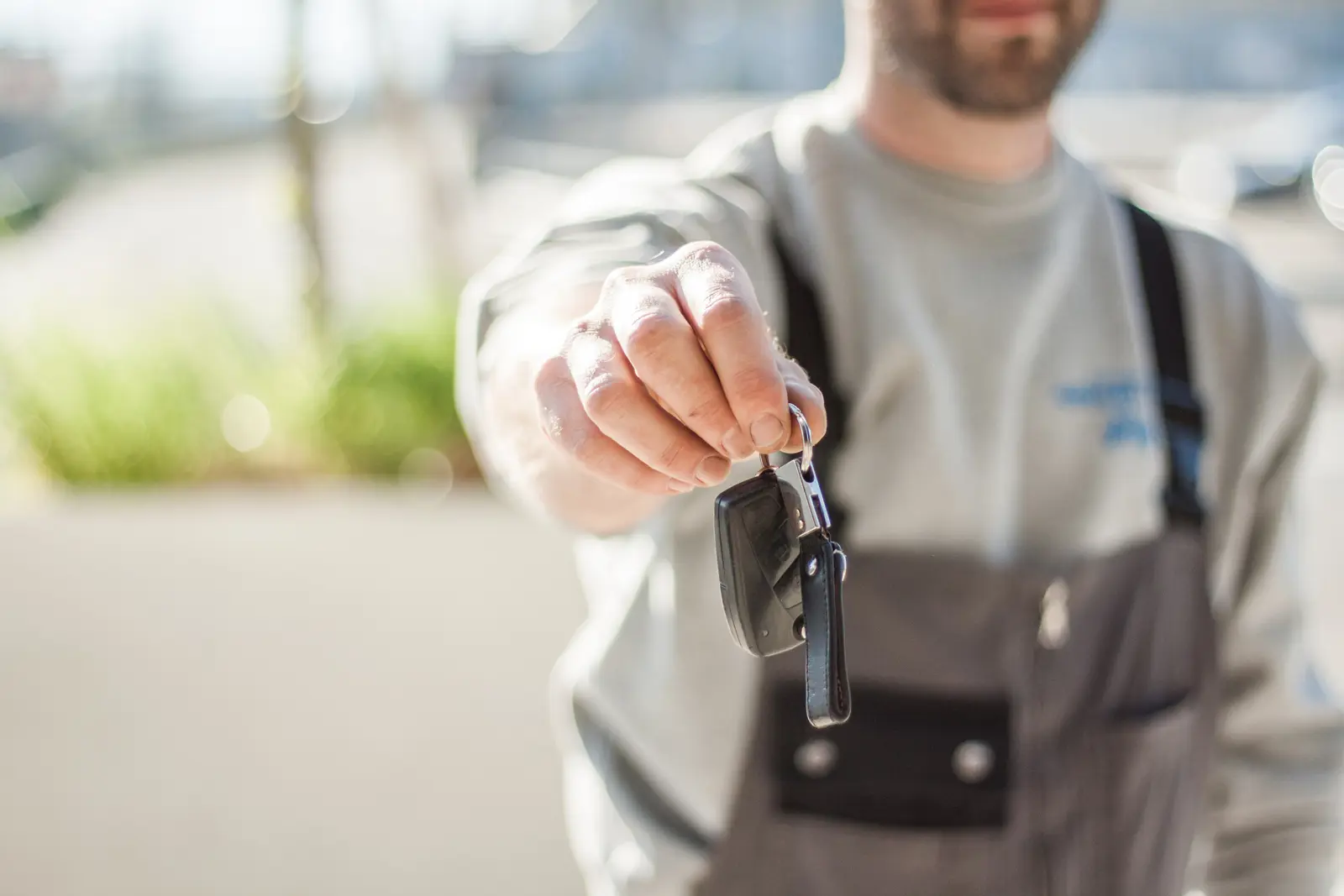How to spot a classic car scam online
14 May 2021

So, you’ve spotted an advert for a classic car you’ve always dreamed of owning. Amazingly, it’s for a price you can afford. You already have a mental picture of it gleaming in your garage…
Stop. Think. Take care. There are lots of fraudsters out there, with a range of shocking scams at their disposal. And they are targeting just about every market going, including that of classic cars.
So how can you ensure that your dream Dodge is not a dodgy deal? And if you’re selling, how can you be confident that your buyers – and their payments – are real?
At Lancaster, we arrange insurance for classic cars that helps protect you on the roads. In this blog, we want to help keep you safe online too, by making you aware of some of the most common scams out there.
Read on to find out how to avoid being taken for a ride by online fraudsters.
Online safety
Scammers have been around forever. So, what makes the web such fertile ground for fraudsters?
Firstly, it’s easy to hide. If a bricks-and-mortar car dealership took out false adverts, your local trading standards officers would be paying a visit sharpish. On the web, it’s a lot harder to track down the people behind the scams.
Then there’s the global nature of the internet: conmen can operate at scale, from anywhere around the world.
Or perhaps you’re new to the world of online car purchases. You might know how to spot a dud at a real-life auction, but maybe you’re not so experienced at picking up the warning signs of an online fraud. With lockdown, many buyers have been forced to go digital for the first time.
Another reason is that there are plenty of great, reliable online auction sites and deals, which fraudsters copy or exploit. Unless you know what you’re doing, you could fall foul of a fraudster.
And finally, conmen succeed because if you think you’ve found the car of your dreams, you might throw caution to the wind in your excitement.
You always need to keep a clear head when it comes to vehicles – whether it’s buying them, driving them, or choosing suitable vintage car insurance for them.
So, what are the scam warning signs that you should be looking out for?
-
Dodgy adverts and listings
If an offer seems too good to be true, then it probably is. You are unlikely to be getting a Jaguar E-Type Series 2 in good condition for less than £20,000, no matter what any ‘seller’ promises.
However, it can be hard to price classic cars, as so many are unique. So, you do get genuine adverts listing absolute bargains.
And many fraudsters know that offering a pristine Porsche at a knockdown price will set alarm bells ringing. Instead, they make their offer seem just a little better than the competition.
While you might think you can just enquire about a good deal you’ve spotted online and pull out if it seems unreliable, the trouble is that you might get sucked in. Fraudsters can be convincing and persistent.
Of course, the details of that dream car will have been cloned from another, genuine website. So even carrying out background checks might not help, as the car is real – just not owned by the person who’s placed the ad.
Instead, it’s been placed to trick you into one of the scams below.

-
Hacking, faking and cloning messages and websites
Every time you get a message or click on a website, remember that it’s easy these days for conmen to pretend to be someone else.
They might have stolen someone’s identity, perhaps through a phishing scam, and hacked into their emails or eBay account. So, you’re not really dealing with ‘Jenny’ whose eBay feedback is 100% positive, but with someone far more dubious.
You’re protected if you stay on eBay and follow its guidelines – but you can guarantee that the fake Jenny will do their utmost to lure you away from the site.
Or perhaps you’re corresponding with someone who appears to be a reputable dealer in Yorkshire, whose emails come complete with logos, VAT registration details and phone numbers. Remember: they could originate from a smartphone anywhere in the world.
Your suspicions might be roused by language errors, or you might notice that the message is sent from a strange email address. But con artists are getting smarter at disguising email and web addresses, and many of them are British or speak English well.
You can check business registrations at Companies House. If there is a company of that name, get their contact details from a reliable source: don’t just click on the link in their email, or phone them on the number they’ve provided.
-
Dodgy payments and overpayments
Conmen might simply advertise a car for sale, take your payment, then disappear without ever sending you the vehicle. But often, the tricks are more elaborate or subtler.
If you’re a seller, you might receive an overpayment. When the ‘buyer’ contacts you to apologise for the mistake and ask for a repayment of the surplus into a new account, you’ll be happy to oblige.
Trouble is, that original payment was made from a stolen bank card or hacked account and your bank will reject it. This can happen sometime after you think the payment has cleared. You’ll lose both your overpayment and any goods you’ve sent.
If you’re using an auction site such as eBay, remember that you’re only covered by their guarantees if you carry out all correspondence and transactions through their site.
If your ‘seller’ or ‘buyer’ wants to switch to chatting by email, or won’t use PayPal to take or make payments, you must walk away.
-
Dodgy deposits, deliveries, and refunds
It’s normal to pay a deposit for a large or valuable item. After all, you’ve been searching high and low for that ultra-rare Jag, and you’re not going to let it escape now!
But you might transfer the cash and then never hear from that ‘seller’ again. You’re no nearer owning your dream set of wheels – but you are a whole lot poorer.
Sometimes, sellers will offer to send you the car for a trial period if you pay a deposit to a delivery company or into a so-called ‘holding account’.
If you’re not satisfied, you just return the car and get your deposit back. Of course, there is no delivery company, and no car – just a lost deposit.
Or perhaps you’re not the buyer but the seller, and you’re advertising a classic car part online. You get an email offering you a deposit, saying they will send a courier to collect the item.
When the courier arrives, you find you need to pay them a sum that is more than the deposit. The ‘buyer’ promises to refund you, perhaps even offering over the odds to compensate you for your trouble.
You hand over the item and the cash – and wave goodbye to both forever.
Think you’d never fall for it? Think again. Many scams work by simply confusing you. In the heat of the moment, you might succumb before you have time to think straight.
If you feel you’ve built up a rapport with your fake buyer, based on your assumption that they share your love of classic motors, then it’s easy to be overly trusting.

-
Fake matching services
If you’re selling a vehicle, particularly a rare or high end one, you might be contacted by someone claiming to have been commissioned to find such a car on behalf of a collector. They offer to match you with this buyer for a small fee.
There’s no mystery collector – just a conman out to pocket your cash.
-
Covid cons
The pandemic was a boon to fraudsters. The national fraud and cyber-crime centre, Action Fraud, saw a 550% rise in vehicle scams between March and July 2020.
Among the many scams were those seeking to exploit people looking for motorhomes for a self-contained and flexible UK holiday.
Thousands of fake ads sprouted up – and the Covid restrictions made it impossible for buyers to travel to view the vehicles. Instead, they had to agree to buy them unseen.
One buyer told the Guardian he had lost £5,000 in an elaborate trick which involved the scammer pretending to be from PayPal’s ‘pay after delivery’ service. Others had been tricked into using fake holding accounts, as above.
While the worst of the Covid pandemic might be behind us now, sadly it seems likely that the scams will mutate!
Top tips for avoiding scams
- Beware of elaborate stories, such as needing to sell at a knockdown price due to moving abroad.
- Beware of ‘sellers’ who have excuses about why you can’t come and see the vehicle, or ‘buyers’ who can’t come to see the one you’re selling.
- Don’t be pressured into making a payment. If your ‘seller’ says other buyers are interested and you need to make a deposit, walk away from the deal until you’ve had time to think.
- Do your research. If you know the going market price for a vehicle, you’ll spot fakes more easily.
- Join a specialist car club and ask for advice. Their members are the very best sources of info about the cars that interest you and can help you find a genuine motor. Membership may entitle you to a discount of up to 25% on classic car cover arranged through Lancaster, too.
- Check multiple sites. While genuine sellers may list their vehicles in more than one place, a classic car that turns up everywhere, repeatedly, is likely to be a fake ad.
- Don’t be too trusting. There are all sorts of subtle tricks that con artists use to lull you into a false sense of security: using women’s names in their listings, for example.
- Stick to using reputable dealers and sites and carrying out all transactions according to their guidelines.

What to do if you spot a scam
If you are suspicious of an ad you see online, or have difficult dealings with any advertiser, contact the site. eBay, Facebook marketplace, and all the online listing sites should take your concerns seriously.
You should also report it to Action Fraud. Classic car clubs will also be glad of the warning.
If you think you’ve been scammed, contact your bank straight away to see if you can stop or claim back any payments. If you’ve been handling the sale through a site such as Facebook or eBay, contact them, too.
Don’t feel too ashamed to act. It’s devastating when you realise you’ve been tricked, not only because you’ve lost your cash, but also because you feel embarrassed at your gullibility. When you try to explain the trick to friends and family, they might not understand how you got taken in.
Fortunately, anti-fraud experts know only too well how easy it is to be fooled by skilled conmen, and you’ll get a sympathetic hearing from Action Fraud and your bank.
We hope that you’ll put it behind you, and that you’ll soon be the proud owner of the car of your dreams.
Contact us for classic car insurance, and enjoy taking your new motor for a ride. Now that’s a genuine pleasure!
Get a quote from Lancaster today
At Lancaster Insurance, we’re the real deal: classic car lovers with more than 35 years of experience in arranging insurance policies.
We search a panel of trusted insurers to find classic car insurance to suit your vehicle, requirements and budget.
Among the benefits we can arrange are cover for static shows and historic rallies; EU cover of up to 90 days; and laid-up cover while you restore a vintage vehicle. Limited mileage discounts are available, too. Check out our definitive guide on classic car restorations for more info.
We offer a UK-based call centre and a 24-hour helpline, so support is always at hand.
Get a quote from our friendly team today.
Policy benefits, features and discounts offered may very between insurance schemes or cover selected and are subject to underwriting criteria. Information contained within this article is accurate at the time of publishing but may be subject to change.
